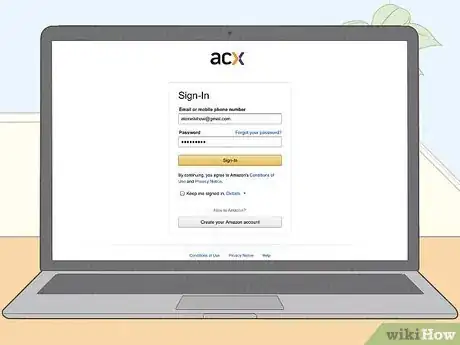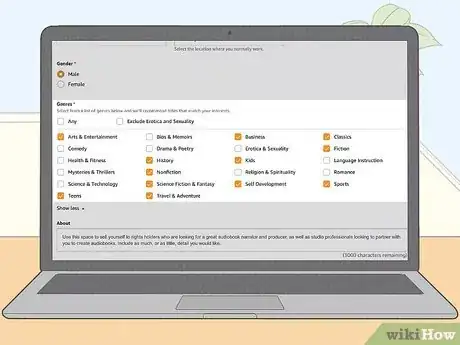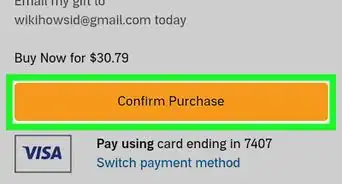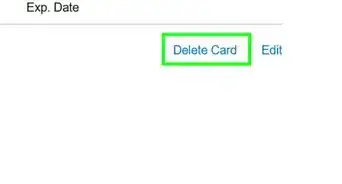X
wikiHow is a “wiki,” similar to Wikipedia, which means that many of our articles are co-written by multiple authors. To create this article, volunteer authors worked to edit and improve it over time.
This article has been viewed 13,782 times.
Learn more...
The audiobook industry is a quick-growing industry. Becoming a narrator for audiobooks can provide a great potential for money. It takes very little to get started.
Steps
Part 1
Part 1 of 3:
Preparing
-
1Purchase and set up professional equipment. When starting out, it is simple to create an in-home studio. All that is needed is a microphone, editing software, and headphones. Although the starting microphone that you purchase does not have to be the most expensive, it does help with editing if you use a proper microphone. You can purchase great, professional-sounding microphones for under a hundred dollars.
- For editing software, there are some free options available. If you have an Apple product, GarageBand is free to download and is usually already pre-installed on MacBooks. If not, there are other free programs, such as Audacity.
- Headphones are very important when it comes to editing. Again, these do not have to be the most expensive or tech-savvy headphones. When choosing headphones, over-the-ear headphones create a safer experience, especially when the editing process is a bit longer.
- To reduce popping sounds recorded by the microphone, a pop-filter is a very inexpensive solution. This can make the audio sound crisp.
-
2Sign up for free services, such as Audiobook Creation Exchange (ACX). ACX is Audible's audiobook site for narrators, authors, and producers. It is easy to sign-up! You can use your Amazon account information since Audible is an Amazon company. ACX creates communication between authors and narrators. The site is easy to use!
- Note that the rest of the instructions in this article are based around the ACX interface. Other services may have similar steps with several differences.
Advertisement -
3Set preferences and abilities while setting up an account. This is important because if you speak and read in multiple languages, ACX will provide more options based on the languages you speak. The preferences also provide options based on characters' gender, nationality, etc. You can also set preferences for which types or genre of books you like to read. If you are interested in the book, the more enjoyable the audiobook will be to listeners. This will help you narrow down your search when looking for books ready for narration.
Advertisement
Part 2
Part 2 of 3:
Auditioning
-
1Browse genres/topics and audition for titles that you are interested in. This process can take a while. When you find something that you are interested in narrating, you must submit an audition to the author.
- The author will provide a short sampling of the book. The sample can be a few lines to a few pages. This is just like auditioning as an actor for a television show or film. If there are multiple characters or emotions involved in the sample, it is important that you adequately express them.
-
2Submit another recording after your audition is approved. Once your audition is approved by the author, ACX and the author will require you to submit another recording. The material for the recording will be the first fifteen minutes of the book.
- This gives the author the chance to decide whether the fit is right for the book. In other words, the author may give you some tips about the characters or ask you to keep certain ideas in mind when recording the rest of the chapters. It is important that you take the author's notes into consideration with each recording.
-
3Receive the full version of the book. Once the author has reviewed and approved the first fifteen minutes of your narration, they will provide you with the full version of the book. They will also give you a date in which the full recording of the audiobook is due. They typically allow two or three months in between the start date and the due date. This is because there will be reviews and re-recordings. Throughout the process, chapters will be submitted individually at first and then collectively.
- It is important to read the book ahead and make notes prior to recording each chapter. This is important because there should be a variation of voices for the different characters. If there is a line in the book that says, "'We ran out of gas!' she exclaimed," you will want to use a voice that implies exclamation. When you read through and notate the chapters prior to recording, you become more prepared for changes in character and mood.
Advertisement
Part 3
Part 3 of 3:
Recording the Narration
-
1Narrate chapter by chapter. When you begin to narrate the book, you will narrate chapter by chapter. In other words, after you read and record each chapter, you will edit and upload each chapter individually. Editing should be done using professional editing software. This will allow the author to listen to each chapter individually and approve the chapters. The better the quality, the better the experience. When editing, be sure to have continuity between takes. Coughing and other noises should not be heard. This is the purpose of editing.
- Expensive is not a synonym for professional. There are many ways to edit these recordings without dropping a lot of money on software (unless you find an editing software that you really enjoy working with).
- It is important that you listen to your own work. It is better to catch mistakes yourself than to have the author catch them.
- Try closing your eyes while listening to edits. It helps with focusing on the sound of the audio clip rather than visuals on the computer screen.
-
2Receive feedback from the author. Once a chapter is uploaded, the author will listen to the recording and provide or suggest any tips or changes to the recording. If the author suggests changes to the recording, it is best that you go back and make those changes to that recording before recording and editing the next chapter. If they make suggestions to the portrayal of a character, the same tips and changes may be crucial to the following chapters.
- They may even ask for you to add sound effects that are central to the storyline. It is important to take into account any changes that they suggest because they are the judge of the final product.
-
3Submit the full work to the author again. Once you have finished recording each chapter of the book, you will submit the full work to the author again. The website will allow the author to listen to each chapter with continuity.
- This is an important process because the author is the first listener of your full recording. It is important that you allow the author time to review this material. Their review will be hypercritical because they want their book presented properly. The author will still have suggestions or requests after you have submitted the first draft of the full work.
-
4Receive additional feedback from the author. Once again, the author will provide you with tips and changes to the recordings or edit. In rare cases, they will only have a few suggestions or requests for change. It is important to follow their notes, suggestions, or requests for each recording. This process may take several days. The author will most likely listen to the recordings multiple times to ensure that the recordings are to their liking or to ensure that they are held to a certain quality. Their opinion is the most important to the success of your audiobook.
-
5Wait for an internal representative to review your work. If the author approves your work, it will be sent to Audible for an internal representative to review. The internal representative for ACX will listen to the audiobook to ensure that it meets Audible's standards. The standards include: being consistent in sound and quality, including credits in the beginning and end of the audiobook, a sample of 1-5 minutes for retail use, etc. The full list can be viewed at ACX.com.
-
6Find out when the book will be uploaded. If the audiobook is approved by the internal representative, the representative will contact you with the date the audiobook will be uploaded onto the Audible platform.
- This isn't the end of your process. It is important that you market yourself and your new piece of work on all social media platforms. The more you post about your work, the more people will listen. This is important because most audiobook jobs are paid based on how many recordings are sold (paid on percentage). Also, the more you market your work, the more reviews and opportunities will present themselves!
Advertisement
About This Article
Advertisement




































































